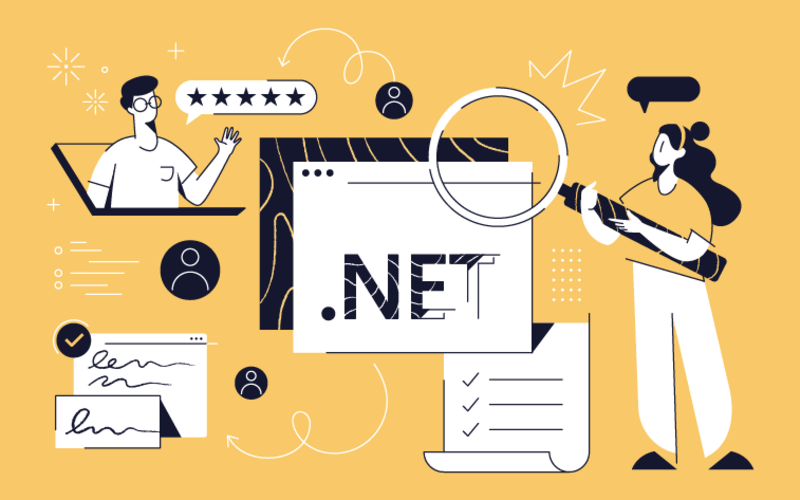This profession requires a lot of practice, and all experienced developers back this up. The basis, the sole start, and continuation of programming and development mean that these professionals hone their problem-solving skills daily. How developers think, speak, engage in communication (including mind-exercising activities) all sum up how they solve problems and think ahead during a task.
Practicing problem-solving doesn’t happen intentionally most of the time, and it could be said it is a type of mindset, a type of curiosity to get to the bottom of things most efficiently. Finding a solution is one thing, but enjoying the process of analyzing and overviewing is what completes the whole mental process of problem-solving in development.
With this said, we could conclude that seeking an easy way out for solutions is not enough for devs, and they need to engage mentally and sometimes even for hours on end once that deep focus starts. Working in development (and programming) includes a great passion for it foremost, and a lot of patience, as well as the ability to engage in long sessions of thinking and delving into uninterrupted focus waves. Later, this results in excelling in a specific development field as well.
In the article below, we will mention a few of the best problem-solving skills that all great software developers have in common and some comments on how all that can be achieved.
Engaging in strategic and parallel thinking
Strategic thinking is one of the best things someone could acquire, master, learn, and practice. This type of thinking, where you know how to recognize and anticipate something in advance, teaches you to calculate risks beforehand and avoid any faulty maneuvers down the road. It is a logical, rational, and calculated way of thinking through leveraging an analytical mindset.
Parallel thinking was a term well known to ancient philosophers and their approaches. It refers to thinking in more than just one direction, similar to a debate, but without any seemingly negative strategies resembling attacks and defensiveness. Instead, parallel thinking options are explored, possible solutions are thought through, facts are considered, until you finally reach a conclusion.
Strategic and parallel thinking is undoubtedly a significant asset when you need to study or practice something specific, and we can assume how valuable they are in the development industry.
In this case, a great developer can focus on one thing, for example, but still do more than one task at a given moment. When devs click and type, they already anticipate what would be needed next or what they need to focus on to resolve bugs or errors efficiently. In this way, developers think of all the possible interactions on the screen and use their ‘perspectives’ to think ahead and apply the best possible actions/solutions.
Reusing solutions
If something worked in the past, why can’t it work again? Devs have no issue using a previous efficient solution; as long as it works and does not interrupt the whole process, it can and should be reused to get a desirable result.
Problem-solving doesn’t always need to be perceived as complex, and the famous ‘Occam’s Razor’ of obvious, simple, and quick solutions can be (re)applied in many development processes.
Great devs use tools and practices that are already used and available and thus simplify their work. Where applicable (and where the task doesn’t require building something from scratch), they achieve excellent results with fewer resources.
Mastering abstraction
Anyone can improve their problem-solving skills by practicing ‘abstraction.’ So, suppose parallel and strategic thinking refers to imagining possible situations, variants to existing conditions, and even possible consequences of a given action. In that case, abstracting is on the other side of the spectrum – a deep focus on the crucial thing only. Let’s elaborate.
Abstracting is crucial for developers, of course, and it’s part of building the mindset needed for this industry. But more precisely, in development, and more specifically in OOP (Object Oriented Programming), it means that the dev works exclusively with the most relevant data and ‘hides’ the rest of the data that’s not crucial at that moment in time.
Abstraction is one segment out of the three aspects of OOP, with the remaining two being ‘encapsulation’ (closely controlled access and hiding specific data) and ‘inheritance’ (transfer of data from ‘parent’ to ‘child’).
But why and how is abstraction an essential problem-solving skill? It’s simple. The dev focuses intensely on the core of the specific task without being distracted by the information they do not need at that moment. This saves time and reduces complexity overall. Perhaps this goes hand in hand with ‘work smart, not (always) hard.’
Of course, in most cases, familiarity or reusing something is practical, simple, or even needed. But, without the curiosity to propel further career advancement, sometimes developers are not motivated enough to apply this notion to practice. This is especially true in computer science and development, where writing clean code or even understanding the underlying structure of application development can make or break a product before launch.
Great devs are curious; they want to delve into deep focus, just as much as they want to explore tools and estimate how useful they’d be for their tasks. This could apply to a different programming language than the one they’ve already mastered, trying out a new technique in the development process, or even experimenting with various frameworks.
Ideally, great devs should know all the ins and outs of the industry – if one framework doesn’t work, they try another; if one programming language is not ideal for the current project, it might be the best solution for another.
Adopting a data-flow mindset
Or, to find a solution to a problem with data flow in mind. This means that the excellent ‘problem-solver’ imagines the data flow and the systems in various scenarios. More precisely, envisioning how data works is not the simplest task—there are embeddings, manipulations, changes, and data transformations present in multiple steps of the app development process.
A great dev focuses on the outcome by visualizing the main goal and subgoals. Often, the mindset here includes diagram envisioning and thinking in terms of structures and sets embedded with one another or in some type of hierarchy. In summary, it involves thinking about how data moves through the system.
Dividing and simplifying workload
Devs know that “the devil is in the details”, or that focusing on smaller tasks will lead to resolving the big issue while at the same time focusing on the big picture as well.
For example, correcting bugs in the code is one way to explain this. Devs look for the bug by reviewing and looking over the entire code from start to finish—the problem may be something as tiny as a comma or a dot in the wrong place.
For a great dev to resolve a specific problem, they first need to understand the problem, and they do this by going through the entire code or each previously completed small task, for example. Division in tasks reduces the workload complexity and makes the dev focus more on possible minor issues they encounter along the way.
Adding challenges in leisure time activities too
Last but not least, almost all great devs also engage (and excel) at mind-exercising leisure activities. Activities like chess, playing cards, and strategy board games all come in handy when thinking about the next move and what the other players/opponents might do next. It is no wonder that some great devs are outstanding gamers as well.
Everyone could benefit from adding a bit of challenge to everyday leisure activities, not just great software developers. These game-playing activities take communication skills to a whole new level by being all about focus, discipline, calculations, and logical thinking. What we learn from such activities can be a solution even to an everyday problem, not just the issues arising in the development job.
Interestingly enough, great devs already know how to think tactfully, logically, and with anticipation for what comes next, so they apply this thinking even in the choice of their leisure activities mentioned above.
The CTO's guide to different hiring models
How to hire for a fast-growing tech company
The takeaway
Good problem-solving skills combine various skills, experiences, mindset schemes, personality traits, and interests.
Problem-solving skills are an irreplaceable asset to have, both professionally and personally. And truth be told, all great devs have outstanding problem-solving skills. But one thing is certain, for mastering problem-solving, practice makes perfect.
 English
English





